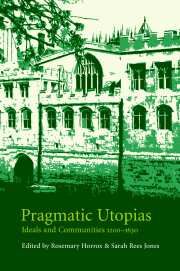Book contents
- Frontmatter
- Contents
- Preface
- List of abbreviations
- Richard Barrie Dobson: an appreciation
- 1 ‘If heaven be on this earth, it is in cloister or in school’: the monastic ideal in later medieval English literature
- 2 The ‘Chariot of Aminadab’ and the Yorkshire priory of Swine
- 3 Godliness and good learning: ideals and imagination in medieval university and college foundations
- 4 Hugh of Balsham, bishop of Ely 1256/7–1286
- 5 A cruel necessity? Christ's and St John's, two Cambridge refoundations
- 6 Coventry's ‘Lollard’ programme of 1492 and the making of Utopia
- 7 Thomas More's Utopia and medieval London
- 8 Social exclusivity or justice for all? Access to justice in fourteenth-century England
- 9 Idealising criminality: Robin Hood in the fifteenth century
- 10 Fat Christian and Old Peter: ideals and compromises among the medieval Waldensians
- 11 Imageless devotion: what kind of an ideal?
- 12 An English anchorite: the making, unmaking and remaking of Christine Carpenter
- 13 Victorian values in fifteenth-century England: the Ewelme almshouse statutes
- 14 Puritanism and the poor
- 15 Realising a utopian dream: the transformation of the clergy in the diocese of York, 1500–1630
- Bibliography of Barrie Dobson's published works
- Index
3 - Godliness and good learning: ideals and imagination in medieval university and college foundations
Published online by Cambridge University Press: 01 July 2009
- Frontmatter
- Contents
- Preface
- List of abbreviations
- Richard Barrie Dobson: an appreciation
- 1 ‘If heaven be on this earth, it is in cloister or in school’: the monastic ideal in later medieval English literature
- 2 The ‘Chariot of Aminadab’ and the Yorkshire priory of Swine
- 3 Godliness and good learning: ideals and imagination in medieval university and college foundations
- 4 Hugh of Balsham, bishop of Ely 1256/7–1286
- 5 A cruel necessity? Christ's and St John's, two Cambridge refoundations
- 6 Coventry's ‘Lollard’ programme of 1492 and the making of Utopia
- 7 Thomas More's Utopia and medieval London
- 8 Social exclusivity or justice for all? Access to justice in fourteenth-century England
- 9 Idealising criminality: Robin Hood in the fifteenth century
- 10 Fat Christian and Old Peter: ideals and compromises among the medieval Waldensians
- 11 Imageless devotion: what kind of an ideal?
- 12 An English anchorite: the making, unmaking and remaking of Christine Carpenter
- 13 Victorian values in fifteenth-century England: the Ewelme almshouse statutes
- 14 Puritanism and the poor
- 15 Realising a utopian dream: the transformation of the clergy in the diocese of York, 1500–1630
- Bibliography of Barrie Dobson's published works
- Index
Summary
‘Universities, as we are all immediately aware when we leave them and sometimes when we are within them too, are in many ways the most strange, illogical and exotic human communities of all.’ Yet universities, and their sometimes stranger, more illogical, and more exotic components, the colleges, have always reflected and sought to influence the concerns and ideals of their societies. For the pre-Reformation institutions, these aspirations are chiefly articulated in papal bulls of foundation and related documents, and in college statutes.
For the universities, such material becomes available as formal processes of foundation evolve in the thirteenth century, their primary document being a papal bull. While validating the foundation, this also commented – briefly – on the ideals behind the new creation, although practical considerations were also significant imperatives.
The idealisation of learning swiftly found voice. In 1289 Pope Nicholas IV, supporting the University of Montpellier, lauded that learning which illuminates the hearts of men and impels them towards virtue, driving away the shadows of ignorance and the fog of error so that men might act in the light of truth. This was explicitly a social role, reiterated at length in Boniface VIII's bull founding Avignon university in 1303, and more succinctly by Alexander V for the University of Aix in 1409. Such study would augment the catholic faith, enhance justice, deal usefully with public and private matters, and increase the prosperity of the human condition.
- Type
- Chapter
- Information
- Pragmatic UtopiasIdeals and Communities, 1200–1630, pp. 43 - 59Publisher: Cambridge University PressPrint publication year: 2001



